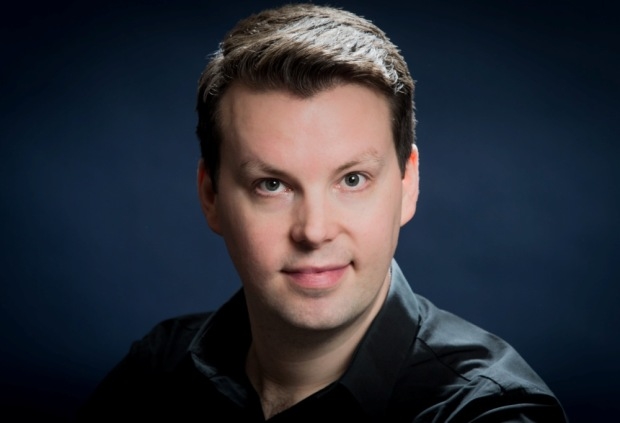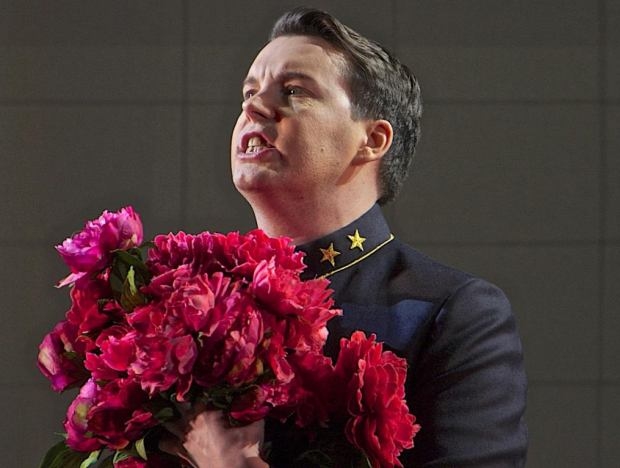David Butt Philip – the tenor years
The star of ENO’s Madam Butterfly on his rise, his plans and how to be a bastard

© Robert Workman
One of today’s most exciting operatic tenors, David Butt Philip is enjoying a significant personal triumph as Lieutenant Pinkerton in ENO’s current revival of Puccini’s Madam Butterfly. Yet it seems only minutes since he was a promising new discovery on the Royal Opera’s Jette Parker Young Artists programme.
You’ve had such a fast rise. Do you ever feel that your career is running away with you?
No, not at all. I’ve been very lucky to have a relatively slow-burn career, actually. I’m 36 but people assume I’m younger. I finished my post-graduate studies eight years ago, as a baritone, then did bits and bobs: fringe opera, chorus at Opera Holland Park, a huge amount of professional choral work. In 2010 I got into the Glyndebourne Chorus, where it was suggested to me by several people, including the conductor Vladimir Jurowski, that I might have a higher level of career as a tenor.
I decided to take the plunge and the rest’s a bit of a blur. Within eight months I was at the National Opera Studio, and within 18 months I was on the young artists programme at Covent Garden.
I feel lucky that it didn’t happen very fast when I was young. I’ve build up lots of experience in small roles and I feel so much better prepared now for the level of work I’m doing.
Recently I’ve had the impresssion that your voice has grown.
Wagner's Die Meistersinger at Glyndebourne was the first thing I did professionally as a tenor, and it was always evident that my tendencies were towards the heavier rep. But you can’t say that when you’re 30. If you start singing things like Tosca and Carmen when you’re just out of college, people get very suspicious and they think you’re going to come a cropper. But my instincts told me that this was the rep that really suited me.
La bohème 18 months ago here at ENO was the first time I’d sung a romantic lead role for a grown-up company. It was, on paper, quite a big gamble for ENO because I was untested in such a big role. But I had covered it before, for Glyndebourne, where I’d gone on three times. I’d covered it at the ROH as well, so I knew the piece backwards. So when I was given the opportunity to sing it here it was the right role at the right time.

© Francis Loney
Without wishing to pigeon-hole myself too much, I love singing these Verismo roles – I love Bohème which I’ve now sung 46 times. This is my first Madam Butterfly, and I’ve got two more Puccini roles coming up in the next 12 months: Il tabarro for Opera North and Tosca for English Touring Opera—both high up the list of my favourite operas. The further up the ladder I’ve gone, the more it’s been noted that perhaps the long-term future for my voice lies in the German and Slavic repertoire. And that is starting to happen, with Jenůfa for Opera North and Boris Godunov for the Royal Opera.
Next year I’m singing Froh in Das Rheingold and the year after I’ll be doing Narraboth in Salome. And there are other Wagnerian and Straussian possibilities on the horizon.
Do you plan to branch out internationally or are you entirely home-grown?
I am so far. I haven’t yet done a serious operatic role for a serious international company, but that is going to change in the near future. I’m in no enormous hurry. I want my career to develop, but I like working in this country and I’ve found working at Glyndebourne and Opera North and the ROH and ETO and ENO to be incredibly artistically rewarding, and the people are so pleasant. Everything’s run so professionally, the staff are fantastic and everyone’s well prepared. I love working for these companies and I don’t think that will stop.
Let’s talk about Madam Butterfly. You have to sympathise with the character you’re playing. is that easy with Lieutenant Pinkerton?
It’s tricky. He’s the first lead character I’ve played with very few redeeming features. It’s a difficult piece from that point of view, seen through modern eyes. The two protagonists can seem one-dimensional and unsympathetic if you’re not careful: Pinkerton simply a cad and Butterfly a weakling as his plaything. The problem with that is it’s not very interesting to watch, and also you’ve got to give yourself leeway in act one to be swept up in the romance. There has to be some element of truth in that or else the music goes for nothing.
Yes, your character may not be sympathetic but the music is as sympathetic as it gets. Is that something you’ve addressed in rehearsals?
Yes. The thing about being a bastard is that he doesn’t realise he’s a bastard. This is just what people do, as far as he’s concerned. ‘I’m in Japan and I’m going to get myself a nice Japanese wife to play with while I’m here.’ You can’t be too self-critical, otherwise it’s a dour three hours if he’s relentlessly horrible from the start.
It’s difficult for audiences as well, because from a modern perspective we look at this guy and we think ‘Who is he? Does he have an ounce of humanity?’ But it’s important not to bring that judgemental perspective to the character.
Of all the lead characters I’ve played in the last few years he is still the most far removed from my understanding of humanity and the one I can least empathise with.
This was the first production of Butterfly that I saw and I’ve learnt it properly through this production. It is incredibly beautiful – possibly the most aesthetically beautiful production of an opera that I’ve seen, which is partly why I was so keen to do it in the first place. It’s an obvious step up for me in terms of vocal size so artistically there was relatively little risk for me in saying yes.
It’s 15 years since I went to music college and I still find it a novelty that I get to do this for a living. I love this job – I wake up every morning and look forward to working. I can’t believe my luck sometimes.
ENO's production of Madam Butterfly continues in repertory at the London Coliseum until 7 July.













